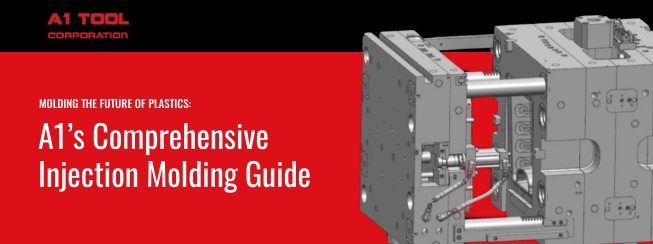How Industry 4.0 Will Impact the Future of Injection Molding
Automation in the plastics industry is becoming more complex, the pace of innovation is accelerating and competitive pressures are increasing. This has put enormous pressure on the plastic injection molding industry. Some companies will be prepared for these challenges and others will be caught off guard.
The manufacturing world is now entering what is being called the fourth industrial revolution — called Industry 4.0, a concept created by industry leaders in Germany. It's a complex idea that means integrating industrial production with state-of-the-art information and communication technologies. The goal is to enable complete, end-to-end communication between people, processes, technologies and end products.
“We’re in the midst of a significant transformation regarding the way we produce products thanks to the digitization of manufacturing,” stated Forbes recently. “This transition is so compelling that it is being called Industry 4.0 to represent the fourth revolution that has occurred in manufacturing … The fourth industrial revolution will take what was started in the third with the adoption of computers and automation and enhance it with smart and autonomous systems fueled by data and machine learning.”
The Future of Plastic Injection Molding
What does Industry 4.0 mean for the future of plastic injection molding? It means that significant shifts are happening in manufacturing that deserve our attention because manufacturers will expect molds to be stronger and more dependable so that they don’t impede the new advanced direction the industrial world is rapidly moving toward.
Industry 4.0 means creating stronger connections across the entire value chain — between suppliers, customers, internal departments, processes, suppliers and customers. In other words, it means vertical integration to connect individual parts and systems of the production cycle to form one single, holistically controlled production system.
Combining traditional mechanical engineering with the latest Industry 4.0 technologies creates new opportunities for plastics processing, particularly in the production of individualized, customized parts and shortening development, startup and setup times. This will enable greater economies of production for both small and large batch jobs.
Gaining the Industry 4.0 Advantage
The term Industry 4.0 encompasses a promise of a new industrial revolution — one that marries advanced (think: “smart”) manufacturing techniques using the Industrial Internet of Things (IIoT), machine learning and big data to create manufacturing systems that are not only interconnected but also communicate, analyze and use the information to drive further intelligent action back in the physical world.
The Industry 4.0 revolution is poised to deliver a wide range of benefits to the manufacturing process, including:
- Greater productivity: It enables companies to produce more products faster.
- Greater efficiency: Companies will experience less downtime and improve tracking and tracing.
- Lower costs: Lowers overall operating costs and allocates resources more cost-effectively and efficiently.
- Greater collaboration: Traditional silos will be broken down and communication will open up.
- Greater flexibility: This makes it easier for production to scale up or down as needed.
- Better compliance: Critical steps can be fully automated from inspections to data logging.
- Better customer experiences: Problems can be quickly resolved, and quality and availability improved.
- Expand innovation opportunities: Organizations can improve business processes, develop new products, optimize supply change and more.
Adapting Manufacturing to Industry 4.0
To adapt to Industry 4.0 initiatives, manufacturing facilities are already increasingly becoming automated and self-monitoring. New machines on the floor are equipped with the ability to analyze and communicate with each other. This gives companies smoother, faster processing, which frees employees to take on other tasks, such as strategic initiatives that can further the company’s success in other ways.
While Industry 4.0 is a relatively new term, it’s already being embraced by companies around the world who are looking for the advances in production it will bring, including faster production and cost savings.
The transition to more advanced production in plastic injection molding will require three critical capabilities to overcome the challenges and gain the full advantages:
- A broad portfolio of technologies that can be quickly and easily integrated into holistic systems
- Scalable, highly flexible and future-proof processes
- Specialists with exceptional expertise working with innovative new systems
While every company and organization operating today is different, they all face a common challenge — the need for connectedness and access to real-time insights across processes, partners, products and people.
Do you want to future-proof your plastic injection molds to help bring greater efficiency, dependability and cost savings to your organization? Work with molding experts who are already prepared to embrace the future of Industry 4.0. To stay competitive and equip your production lines for the future, the time to think about the next stage of your Industry 4.0 journey in plastic injection molds is now.











